In the depressing story we are told of Israel and Palestine, from the run-up to 1948 until the present day, one important group of people at the centre of this strife often go unmentioned—Arab Jews. With members of the community stating that they face racism from the Israeli state and are not fully accepted into mainstream Jewish society for their Arabness on one hand, and on the other hand often not being fully accepted as part of the wider Arab community due to their Jewishness being unfairly associated with Zionism, Arab Jews have found themselves stuck in the middle.
Hadar Cohen is an Arab Jew from Palestine who has garnered a growing and keen audience of Arabs from across the world of all faiths by taking to Instagram to talk about the Arab Jewish community, Palestinian liberation, and the diverse and fascinating ways these interrelate. Cutting through simplistic narratives that all sides of the debate have, Cohen points to the mostly untold history of Arab Jews that she believes can help us better understand how to achieve Palestinian liberation and heal bonds between the Arab Jewish community and the wider Arab world.
We sat down with Hadar Cohen, shortly after she was featured on an aftershow for the award-winning series Ramy, for an interview to find out more about why her call for Palestinian solidarity as an Arab Jew has caught the attention of so many and why the Arab Jewish community has been an integral part of Arab history and culture. Both proud of her Jewish and Arab identity, Hadar elaborated on the complicated history and conflicting identities that the Arab Jewish community has, the importance of Palestinian liberation, and how the fight against anti-semitism and for Palestinian rights are two sides of the same coin.
In the news, academia, and sadly seeping down through into our everyday vocabulary, we often talk about Arabs and Jews as necessarily distinct groups. But you are both an Arab and a Jew, and very much proud of both of those aspects of who you are. Why is it that we know so little about Arab Jews? And why do some even think the term ‘Arab Jew’ is an oxymoron?
There’s so many ways to answer this. The last few decades have witnessed a massive shift in the Arab world on so many levels. Throughout the Middle East, we’ve seen a rise of a very intense, confused, and distorted understanding of race and religion, but also nationalism, religious supremacy, Western infiltration, colonisation, and imperialism both from Europe and the US, and all these forces are interested in the erasure of the Jewish Arab identity because it doesn’t serve a certain narrative. Obviously, it doesn’t serve the Zionist narrative at all. The second you say an Arab Jew, the idea of the whole project in some way completely falls apart. So, that identity is very threatening and there was a very strong effort to erase it and sadly it really worked. A lot of people nowadays, like some of the youth growing up in Egypt, don’t know that Jews used to live there and they think that all Jews are in Israel.
One of the things I sometimes do, especially when I’m travelling to different places, is I like to go to Arab bookshops and ask, “do you have books by Arab Jews or about Arab Jews?” And they immediately point me to the Israel section. Now for me, that’s a joke. There’s thousands of years of Arab Jewish history, not just political history, but the arts, culture, life, and all of it, yet what a lot of Arabs know about Arab Jews is only through Israel. So, it’s quite depressing to see how much that project really worked in erasing us.
For me, I grew up with the narratives of the Holocaust and the Nakba, and these were presented as the main narratives that were so centre stage, especially around Israel–Palestine dynamics. But for Arab Jews, we’re obviously part of both stories, and those atrocities both affect us in very different ways. But none of them are our own story, we have our own traumas that never actually get brought to the table.
You were recently featured on an official Ramy after show for the release of its third series to discuss how you have negotiated your own identity as an Arab Jew. Can you tell us about yourself and your history, and how you define yourself?
First, I want to say that it was such an honour to be part of the Ramy aftershow and I’m such a fan of everything they’re trying to do with that show. I think it’s really opening up conversations that are so necessary for us to have in the Arab community, not just about racism, religion, and identity, but also about spirituality, connection, healing, and trauma. I see this as part of a larger conversation that needs to be had.
I, myself, was born in Jerusalem and my family have been there for over ten generations. My ancestors also came from Aleppo, Baghdad, Shiraz, and Kurdistan, so really a mix of so many different places. I mostly grew up with Aleppo and Jerusalem traditions. It’s interesting this identity of being an Arab Jew because you grow up really confused, and I think this is a common experience. You’re not really allowed to be an Arab Jew, especially not in Israeli society in the public sphere. You’re kind of confused about what you are and I think for me I really didn’t think I had an identity. You have the German Jews, Ukrainian Jews, Polish Jews, and the Russian Jews, and I was like, am I a Jerusalem Jew? I think there was a moment in my development process where I was like, “ok my family has been in Jerusalem for a long, long time, and were from Syria, so I’m Arab. What else am I?”
It’s an in-between identity. Sometimes people talk about it as almost a queer identity where you’re like neither here or there. In some ways this a beautiful power and blessing because so often you’re talked about as being the bridge community who can heal the divides and the ruptures. But sadly, a lot of the time we end up just being the group that just unbelongs everywhere. Not here and not there. So, it has both the dimensions of being a blessing and a curse.

With Egypt’s once sizeable Arab Jewish population now dwindling and Iraq’s once vibrant Jewish community now almost going extinct, the Arab Jewish community across the region appears to be completely marginal. Was the Arab Jewish community ever an important part of the wider cultural and social fabric of the Arab world?
Arab Jews were integral to Arab culture, to Arab politics, to Arab everything. We were foundational to the creation of the Arab identity. If you want to teach about Arab art, music, and cinema, it’s impossible without lifting up the Arab Jews that were so central to these cultural and artistic creations.
Liela Murad, of course, was a classic Arab Jew and singer, but how she used to be Jewish is often ignored. This history isn’t taught, but especially in music, Arab Jews have such a strong legacy. But this is also what makes it so painful, to think how this history has just been completely wiped.
The Arab region throughout history was a place where people came to mix, it was such a melting pot of different people. I see this with my family and here in Palestine, you hear the older generation saying how they grew up celebrating all the holidays because that’s just what you did. You celebrated the Christian holidays, you celebrated the Jewish holidays, and you celebrated the Islamic holidays.
It seems like the Arab Jewish community in the region in many ways was just as integrated as any other and considered their fellow countrymen as brothers and sisters. How did in just a few short years after the foundation of the state of Israel in 1948, these sizeable and integrated communities almost entirely disappear from the region?
This is something we’re still trying to figure out. The forties and fifties were such turbulent moments in the history of the world; so much was changing and happening. People didn’t know what all these changes meant. If you read narratives from Jews in Iraq, they had been living there for thousands of years, this was their homeland, and they never imagined leaving. They started getting news of the Holocaust pretty late and once they heard about what was actually happening in Europe, suddenly the Farhud in Iraq was starting and violence against Jews was starting. It was a very scary moment and people didn’t know what was happening. You’re hearing all this horrible news coming from Europe and you’re seeing the community that you were so integrated in rise up against you, and all of a sudden Zionist Mossad agents are coming to recruit you to a religious project.
There was a lot of confusing things going on and I think you really see that with the generation of Arab Jews that were displaced from Arab countries. It was a time of such confusion and upheaval that a lot of people weren’t really making their own choices. People didn’t wake up and be like, “this is what I’m going to do”. It was choices for survival and choices by government and their plans. But, we also see a lot of Arab Jews who decided to stay. Either they decided to stay and hide their Jewish identity or run away to some village where no one could find them. Or they decided to stay and were very proud, like some of the Jewish women now in Egypt, who were like, “no! I’m never leaving, this is my home”. Obviously though, this was very few people because it takes so much courage and integrity to be able to hold that stance.

Do you feel that Arab Jewish community has been exploited to further certain political aims?
Israel definitely used us. You can see this historically and the evidence is very much there. Farhud is a very good example, which was the uprising against Jews in Baghdad, and it turned out that Mossad agents planted bombs in synagogues to scare the Jewish community in Iraq and blamed Muslims to pressure people to move to Palestine. Israel still denies those accounts, but I was just talking to a professor a couple of weeks ago and he was telling me that he was a witness in the Farhud trials and he watched the Israeli state basically pay historians to rewrite the history. Israel did that, but a lot of the Arab governments also did that. They both rewrote history to completely wipe out our narrative. The Arab Jewish identity is a weaponised identity. People are constantly using our narratives to justify whatever they want to justify, so in that way it’s quite lonely.
There is such a deep rewiring of history. Israel has an agenda of saying, “look at how the Arab countries didn’t treat you well, you didn’t have belonging and that Israel saved you”, and that’s a very strong narrative in Israel. And in Arab governments, there’s a narrative that our Jews betrayed us by participating in Zionism, but they don’t want to look at the facts that, especially both in Iraq and in Egypt, in the late forties you had a thing called the AZL, the Anti-Zionist League. These Arab Jews talked about Zionism as being like a disease coming to fragment us from our Iraqi or Egyptian siblings, and how they didn’t want that. At the beginning, when Zionism was starting, Arab Jews saw themselves as Arab. Fighting for Palestinian freedom was an Arab problem, so a lot of these communities would send money and resources to Palestinians fighting Zionism. But this history is never told either, we just pretend that Arab Jews became Zionist overnight, but that’s not exactly the situation. Arab Jews were put in a very vulnerable situation and were let down by both the Ashkenazi Jews coming from Europe and their Arab neighbours who didn’t fully have their backs and stand up for their rights. And now we are here where we are a few generations later trying to figure out and understand how we got here and how we can undo some of these divisions in our communities.
Are the fight against antisemitism and for a liberated Palestine separate issues?
Definitely not, they’re the same thing. Any freedom for one group of people means the freedom of all groups of people. And in this way, this is against the logic of Zionism, which is about the freedom of Jews and against the freedom of Palestinians. To me, freeing Palestine and understanding what is happening here, especially from the idea of violence and trauma, is very much to me the same conversation as understanding Jewish trauma. Jewish liberation and Palestinian liberation are bound together and they need to coexist. We can’t talk about one without the other. One of my fellow activist says all the time that the more you root in your own struggle of being an Arab Jew, the more it just immediately leads to Palestinian liberation and solidarity. You learn what was done to you and your community and your family, and you one hundred percent ally with Palestinians.
I’m very much committed to Palestinian liberation and the freedom of Palestinian people, and sometimes there’s a bit of an allergic reaction in the free Palestine movement towards Jews, and they don’t know what do with Jews. But, what are we actually fighting for? A free Palestine is a multi-religious and multicultural state.

Does the ideology of Zionism treat all Jews equally?
No, not for all Jews. A lot of the time, Arab Jews, oriental Jews, and Jews from Arab and Muslim lands were often victims of the Zionist project. Even today, the level of racism from the Israeli state towards specifically Arab Jews, but also to Black Jews, Ethiopian Jews, and other types of Jews from a racial caste system, targets Arab Jews because the anti-Arabness in Israeli society is so strong.
We can see this so clearly from the early writings of Zionism. The way they talk about Arab Jewish communities in the same way they talk about Palestinians, saying they’re barbaric, uneducated, and uncivilised. There’s even early Zionist writers who say that Arab Jews aren’t really Jewish. I read this one quote claiming that Arab Jews don’t know the Torah, they’ve never even read one line. There’s this dehumanisation and still to this day a way of labelling us as the primitive, conservative, desert people who don’t know what they’re doing and haven’t been to university.
You’ve steadily grown a significant following on social media by talking about Palestine, discussing the issues facing the Arab Jewish community, and tackling misconceptions about your community. Why did you think it was important to do this?
To be honest, I never thought I would be where I’m at right now. I think I became the Arab Jewish poster-child for a lot of people and really didn’t think that I would be doing this. I want to answer this in a few ways. First, I want to say that the level of trauma and pain Arab Jewish people experience both around confusion of identity and belonging means it’s a really hard identity.
Instagram is overwhelming in itself, but speaking about Palestine to the international community is a big task and a very charged thing. You’re putting your identity on the line and sometimes you’re putting your family or stories out there, and it’s not an easy thing. But, I think my accounts blew up because I started talking more about Palestine and people were like, “oh great, a Jewish voice for Palestine”. And then, I started revealing to them that, actually, I’m not a typical voice that they think of when they think of being Jewish, because they normally think of Jews as European. People just started really being interested and wanting to learn, so I started sharing a little bit more and a bit more, and a bit more.
For me, I started putting so much energy into international solidarity movements, especially between Arab Jews, Arab Muslims, Arab Christians, and the Arab diaspora because I think the more we are connected, the more we can regain our power and move toward greater solidarity with Palestine.
Scoop Empire’s readership, while spread across the world, is predominantly Arab and includes a diverse range of people spread from the United States to Jordan and back. If there was one misconception about Arab Jews you would like to address, what would it be?
I always wanted to speak to the Arab community directly and I wanted to speak to the Arab world directly, not through the West, not through Ashkenazi Jews. But just to speak, because I felt like that was stolen from me, this right to be in communication with my own community. So first, I want to say that with my Instagram videos, something I’m very conscious of is that even though I do sometimes live and spend a lot of time in the West, when I’m speaking or writing I’m actually not writing for the West, I’m trying to write for back home.
The other thing I want to say is that the narrative of betrayal and mistrust in our communities is so deep. There’s this deep loss and I want to really share an invitation for mutual healing and connection to let go of some of the narratives that we’ve been fed of who hurt who and actually just get to exist and hold space for each others pain for what was lost and fragmented.
People always say about Palestine that pre-1948, we all lived together and coexisted. This is a narrative that is used all the time, which isn’t wrong. But for me, why are we always looking at the past and not the future? What does it look like to rebuild those relationships?
WE SAID THIS: Don’t Miss… Archaeology As Resistance In The Gaza Strip




